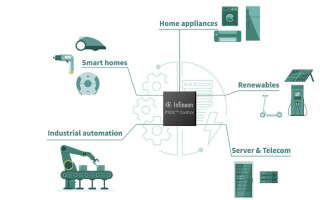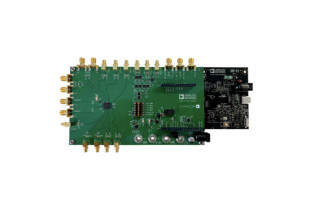New Infineon MCU Offers Motor Control from Home to Enterprise
July 31, 2024
Story

Motor control is critical to thousands of device types, from simple home appliances to advanced medical equipment. Moreover, the continuing drive toward automation has made it a must-have in industrial and edge devices.
Now, Infineon is entering the space in a big way, with a new family of MCUs under the PSOC banner.
According to an announcement today, Infineon’s new series of MCUs, called the PSOC Control Family, is designed specifically for both industrial and consumer motor control, and will also apply in power conversion system applications. The company said it envisions the family will contribute to embedded computing for home appliances, drones, power tools, renewable energy products, industrial drives, and lighting and computing/telecom power supplies.
“This is the first set of products designed to be ready for the transition to more integrated embedded systems,” said Steve Tateosian, SVP of IoT, Consumer and Industrial MCUs, Infineon Technologies in a recent interview. “These are designed to help companies get the bandwidth they need, today.”
 The PSOC Control family is based upon Arm Cortex-M33 core, Infineon said, and it is built to allow users to optimize and accelerate the measurement, waveform generation and real-time performance operations through on-board functionality and through software. This group is, like all Infineon MCUs, supported by the company’s ModusToolbox Software, which is a development ecosystem that is designed to enable quick and simple product evaluation and production. For this line, it includes building blocks for Field Oriented Control (FOC) of brushless and permanent magnet motors, power conversion algorithms (PFC, LLC, Buck, etc.) and device drivers.
The PSOC Control family is based upon Arm Cortex-M33 core, Infineon said, and it is built to allow users to optimize and accelerate the measurement, waveform generation and real-time performance operations through on-board functionality and through software. This group is, like all Infineon MCUs, supported by the company’s ModusToolbox Software, which is a development ecosystem that is designed to enable quick and simple product evaluation and production. For this line, it includes building blocks for Field Oriented Control (FOC) of brushless and permanent magnet motors, power conversion algorithms (PFC, LLC, Buck, etc.) and device drivers.
The ModusToolbox Motor Suite is also supported for all devices in the PSOC Control family, according to the release. This suite includes software, tools, and resources that makes it possible for the ModusToolbox to support motor control applications. It’s designed to reduce the complexity of motor control use cases and support advanced motor control development kits, selection of control algorithms, and to enable the testing, tuning, and monitoring of motor parameters.
“The new Infineon PSOC Control MCUs extend the company’s commitment to delivering performance and efficiency in next-generation motor control and power conversion applications,” Tateosian said. “With extensive on-board analog functionality, high performance timers, hardware math acceleration, and a rich design tool ecosystem, the new device family will enable system designers to deliver innovative, energy-saving devices to both high-volume and specialized markets.”
Key specifications of the new MCU family include clock speed of up to 180 MHz, high performance analog-to-digital converters (ADCs), high-resolution (<100 ps) pulse-width modulation (PWM) and an integrated CORDIC Accelerator to off-load real-time control tasks from the CPU. CORDIC’s true synchronous “idle” sampling of up to 16 analog signals from the single core ADC reportedly is up to 25 percent faster without sampling jitter. It’s tested to <10 uA deep sleep and <1 uA hibernate modes, which should deliver serious energy savings for low-power and battery-driven applications.
Infineon says its PSOC Control family can support power electronics based on wide-band gap
The first two MCUs in the Infineon PSOC Control family – with CPU clock speeds of 100 MHz and 180 MHz and up to 256 KB embedded flash – are now available for early access customers, with full market availability in Q1 2025.





